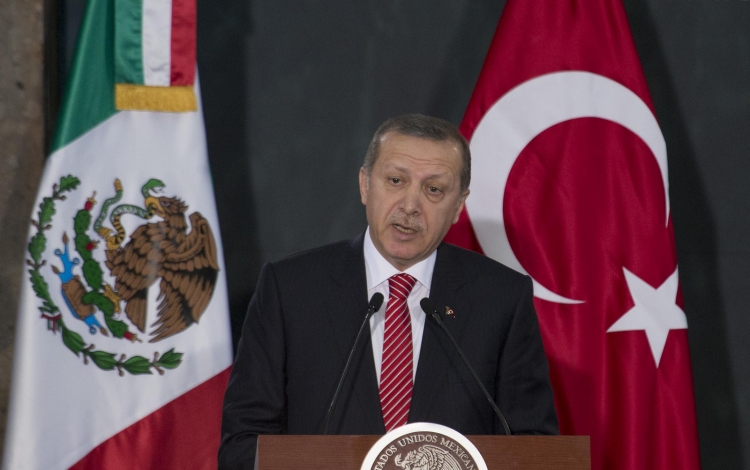Preserving AKP power

Professor Louis Fishman of Brooklyn college and regular writer for the Israeli newspaper Haaretz came to the American University of Paris on Wednesday 14 February to give a talk on the current state of politics in Turkey. The Justice and Development Party (AKP) which was founded in 2001, has been in power since 2002. The focal point of the talk was his stance that current Turkish foreign policy mirrors their domestic policy and the three phases of AKP power.
He began his speech by outlining the current formation in AKP power, and detailing the shifts from friendly foreign policy to its current state as an agitator, which he claims is short-sighted and scattered. The AKP was formed as a center-conservative party, at first drawing a wide range of politicians from different parties with their core from the Islamist Virtue Party. Center-left and nationalist party members were included, but the new Muslim-left was excluded. The party members claim to be centrist and secular, disavowing their conservative and religious ties.
Professor Fishman argues that there are three turning points in the reign of the AKP: when they took power in 2002 until 2007, while president Abdullah Gul is the foreign minister; from 2009 to 2015, the time of Recep Tayyip Erdoğan as prime minister; and after the attempted coup in July of 2015 to present.
In the first period, there was an idea of a change in foreign policy inculcated by the AKP. The relationship with Armenia, which is tense in Turkey, was seeming to ease as Foreign Minister Gul engaged in what professor Fishman called “football diplomacy.” Gul went to Armenia to see a football match, making sure he was caught by the press smiling, enjoying himself. Later, the Armenian foreign minister went to Ankara in a similar show of fidelity.
There was also an attempt to align with the domestic and foreign policy with the European Union to make a bid for membership. As Turkey is already a member of NATO, they perceived joining the EU as not too difficult. During questions, professor Ziad Majed of the American University of Paris history department was very critical of the snubbing by EU officials that continues today, calling it racially charged and biased due to religion. Professor Majed cited Hungary and the current authoritarian push in Eastern Europe as examples of the bias, saying that the politics there are no worse than what is currently happening in Turkey.
There was also a warming towards Israel in the first phase of AKP power. Fishman included an anecdote about Erdogan, saying that he is famous for hating tobacco of all sorts and does not let people smoke around him, but after facilitating peace between Syria and Israel on the condition that Israel pulls out of the Golan Heights, Prime Minister Netanyahu was allowed to strike up a cigar in Erdogan’s office. The grace period with Israel culminated in Erdogan and his wife taking a trip to the Yad Vashem Holocaust museum accompanied by its director, Avner Shalev.
Professor Fishman talked also about the recent scandal enveloping Netanyahu, how he supposedly paid off a newspaper for good press and the general trend of discrediting the press that is also being followed by Trump. He was scathing when discussing the Turkish state press, saying that it is basically at the level of Pravda before the fall of the USSR.
Since the 2007 strike in Gaza, the AKP is no longer willing to cooperate with Israel. This came at a time when the goodwill foreign policy started to fall apart, as, traditionally, Turkey has had ideological and cultural disputes with border countries, excluding Georgia.
During the reign of the AKP in the first decade of the 21st century, there was a plan implemented to make Turkey, and Ankara and Istanbul specifically, a hub for Arab tourism. The country was seen as accepting, allowing people to drink and smoke hashish, and the construction of a major airfield for Turkish airlines facilitated travel. Pockets of the cities started to transform as tourism grew.
The major mistake of Erdogan’s reign, according to professor Fishman, was the adoption of Egyptian president Mohamed Morsi in 2011 as a beneficiary of Turkish goodwill. In 2012, the AKP brought Morsi to a conference in Ankara. A year later the AKP promised $5 billion to Egypt in aid. This marked a shift in position from the AKP, putting them even further at odds with Israel. The Arab Spring happened shortly after, and Morsi was toppled.
Professor Fishman said that one of the few good foreign policy decisions that were made was the strengthening of relations between Turkey and Syria. Because Turkey invested in Syrian banks and both countries lifted the requirements for visas, the mass migration of refugees during the Syrian civil war was possible. With only the need of a passport, Syrian citizens were able to flee into Turkey when the war started.
Now, post-coup, the goal of the AKP seems to be to preserve power. It is difficult to make sense of the tectonic shifts in domestic and foreign policy. Erdogan seems, at one point, to want to join the EU, and then at others decides to call Germans Nazis at the Dutch conference. The relationship with Russia is similar. Right after shooting down a Russian plane that they claimed invaded their airspace, they strike a deal to have a pipeline run through Turkey.
Professor Fishman finished by taking questions. One student asked about the coup, parroting a common storyline saying that it was AKP constructed. Professor Fishman said, "I don't think we will ever have the answer about what happened that night."







